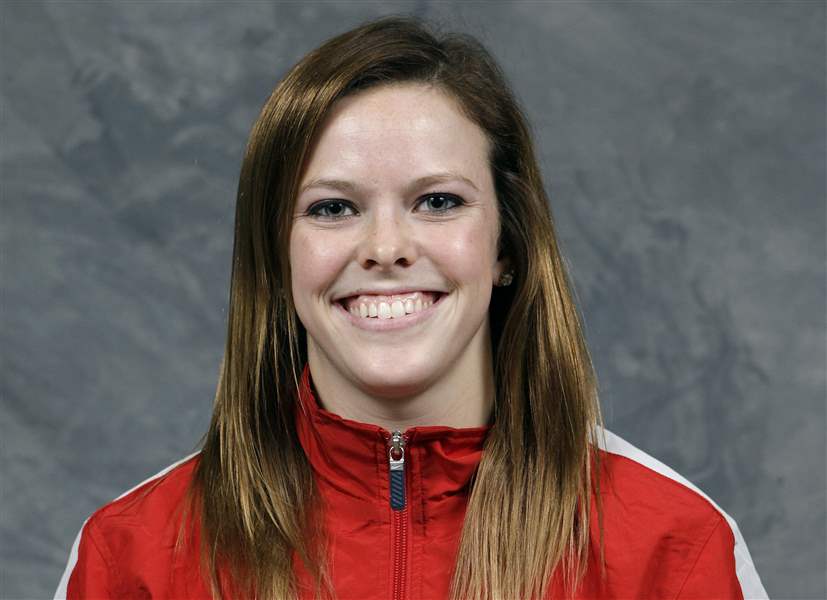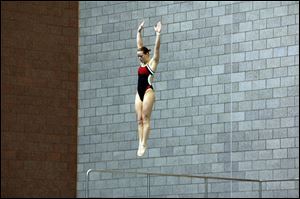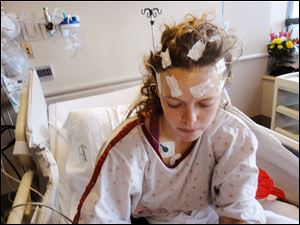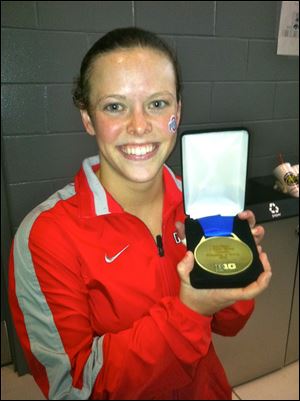
Olympic hopeful undeterred by stroke
Temperance native's spirit takes her to diving trials in Seattle
6/9/2012
Cheyenne Cousineau.

Cheyenne Cousineau, a Bedford High School graduate, prepares to dive during a meet. Now a third-year sophomore at Ohio State University, Cousineau returned to diving six months after suffering a stroke.
COLUMBUS — Cheyenne Cousineau will be right where she expected to be all along when she dives at the U.S. Olympic Trials later this month outside Seattle.
How the 20-year-old Temperance native reached the brink of her dream is another story.
Cousineau had everything going for her when she arrived at Ohio State on a full scholarship as one of the nation's top diving recruits two summers ago. She was an aspiring doctor with Olympic ambitions.
Then, none of that mattered.
On the night after her 19th birthday — July 29, 2010 — Cousineau suffered a stroke caused by a blood clot in her brain.
A mysterious nagging pain behind her left ear came into context as she sat alone in the off-campus apartment she shared with her older sister, Sierra. Her vision and mind a blur, Cousineau thumbed the number one on her cell phone to speed dial "Mom." But she could not form a coherent sentence, simply repeating, "I can't" and "I don't."
"She wasn't making any sense," said her mother, Diane.

Cheyenne Cousineau.
Cousineau remembers nothing more. Paramedics and Sierra, who raced home from the nearby state fair, found her in the grip of a seizure. Four medics were needed to hold her down before she slipped into unconsciousness.
Sitting in the front seat of the speeding ambulance, Sierra prayed for help.
"Lord, Jesus, don't take my baby sister from me," she said.
When Cousineau awoke hours later, the concern was not about diving — doctors said she would not compete again — but whether she would be a functional college student. A later scan revealed the stroke had left a dead spot the size of a nickel in her brain.
"Is she going to be able to come out of the hospital and add two and two and read a sentence?" OSU diving coach Vince Panzano recalled thinking.
Nearly two years later, Cousineau believes every prayer was answered.
Rejecting the early prognosis, she returned to diving this season and won the Big Ten championship in the 10-meter platform event, all the while rediscovering success in the classroom — now as a psychology major. On June 20, the three-time state champion at Bedford High School will compete in Federal Way, Wash., for a spot in the London Olympics.
"God could have easily just taken me away like that, but he's given me a second chance," Cousineau said. "I found out that every day I'm on this Earth is a treasure and I'm just going to live it to the fullest."
Long odds
She will face a steep challenge at the trials. Cousineau must finish among the top two in a field stacked with more experienced rivals, and even she concedes making the 2016 team is more realistic.

A scan of Cheyenne Cousineau's brain showed a dead spot the size of a nickel.
But she knows about long odds. The script can be rewritten.
Cheyenne, the youngest of Diane and Roland Cousineau's five children, found success first as a gymnast. But she took up diving on a whim in junior high school and proved a natural.
Cousineau began training daily after school in Ypsilanti, Mich., where Eastern Michigan coach Buck Smith saw in his new student a rare combination of grace, athleticism, and courage — the same traits that served her in gymnastics. She became adept at all three heights: 1-meter, 3-meter, and the platform, the latter of which required a 33-foot plunge that chills most novices.
Smith recalled an instance during Cousineau's freshman year when she got lost in a platform dive known as a twister, landing flat on her back.
"That's like hitting a wall at 40 miles per hour," Smith said, "and a week later she's doing the same dive again. That's when it dawned on me that she's something special. If most kids smashed like that from 10 meters, they're not going to get up there any time soon."
The event instead became Cousineau's signature, and by her senior year at Bedford High School, nearly every program in the country was in pursuit.
"I remember watching her and thinking to myself she's as good as anybody we currently have in our program," said OSU's Panzano, who has coached 86 All-Americans and eight Olympians.
Off to OSU
Sold on Panzano and the proximity of OSU, she enrolled in classes the summer before her freshman season. All was smooth until mid-July when Cousineau first felt an ache behind her left ear. No one could figure the cause.

Cheyenne Cousineau won the Big Ten championships' platform diving title for Ohio State in February.
Her mother's side of the family had a history of blood clots but none in the brain. A doctor dismissed the escalating pain as an ear infection and prescribed her Amoxicillin.
Early the night of July 29, the clot gave way to a four-hour block of time vanished from memory. Upon waking up in the hospital at OSU, Cousineau learned she had suffered a stroke, which occurs when the blood flow to part of the brain stops — an unlikely occurrence in a young adult. Neurologist Michael Nagel of ProMedica said about 3 percent of stroke victims are between 15 and 30, with potential long-term damage depending on the location.
"You could have strokes in certain parts of the brain where after the recovery phase you may not know that the person even had a stroke," Dr. Nagel said. "On the other hand, you may have a very small stroke in a crucial area of the brain where you're left with a devastating paralysis."
Cousineau recognized her family, which told Sierra, "OK, she's there. She's actually there." She responded well to treatment, including a cocktail of blood thinners and seizure medication, but her brain had suffered damage.
The road back
Cousineau, who was released after four days, struggled when she returned to school in the fall. Though still exceedingly bright overall, she could not summon the same razor-edged math and science skills that made her ace the most advanced courses in high school. A biochemistry major, her classes were overwhelming.
"It was the same kind of stuff from high school and it was a whole heck of a lot harder in college," Cousineau said of one calculus class her freshman year. "It was really frustrating because it was like, ‘Man, I know this stuff.'?"
Cousineau stubbornly refused to seek help from tutors and instructors, and her grades suffered. She called winter quarter a "pity party." Unable to dive, Cousineau mostly stayed in her dorm. The former straight-A student stopped going to some classes.
"I just kind of gave up," she said.
A new beginning
Her spirit, however, renewed in the spring. After a teammate convinced her to begin attending Athletes in Action meetings, Cousineau said the Christian sports ministry shifted her perspective. "I'm not living for myself," she said. "I needed to live for God."
Cousineau recommitted to school. She sought aid from the athletic department's academic support staff and became a regular during office hours, sharing her story with professors.
Cousineau, who now plans to add neuroscience as a second major, earned a 3.2 grade-point average last quarter.
"I came to the realization that I had to make a greater effort than I did in high school, and I had to work harder and put myself out there and be vulnerable," she said. "The days became better and better after hitting rock bottom in winter quarter."
She was also buoyed by a return to the water. Feeling well and cleared to wean off the blood thinner, Cousineau returned to diving six months after the stroke.
It was as if she never left.
After Cousineau defeated a field of 27 divers to win the platform title in February at the Big 10 championships in Iowa City, Iowa, she beamed to a poolside television reporter.
"Amazing," she said. "It hasn't really set in yet. There are no words." Her mother, Diane, fought back tears in the crowd. Sierra, following the meet online in Columbus, celebrated in her apartment.
Cousineau was back, though far from content. Among the then-redshirt freshman's next sights: the Olympics … in 2016.
"Not that I'm totally throwing out that I can't make it to 2012," Cousineau said.
She knows better.
"I am blessed," Cousineau said.
Contact David Briggs: at dbriggs@theblade.com, 419-724-6084 or Twitter @DBriggsBlade.